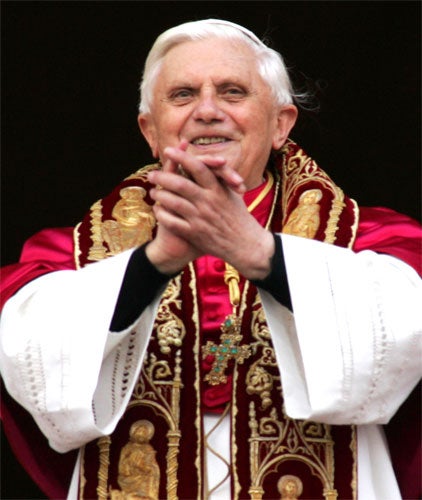Pope Benedict to arrive next year for grand tour of United Kingdom
Millions will turn out for only second papal visit to Britain since 16th century

Your support helps us to tell the story
From reproductive rights to climate change to Big Tech, The Independent is on the ground when the story is developing. Whether it's investigating the financials of Elon Musk's pro-Trump PAC or producing our latest documentary, 'The A Word', which shines a light on the American women fighting for reproductive rights, we know how important it is to parse out the facts from the messaging.
At such a critical moment in US history, we need reporters on the ground. Your donation allows us to keep sending journalists to speak to both sides of the story.
The Independent is trusted by Americans across the entire political spectrum. And unlike many other quality news outlets, we choose not to lock Americans out of our reporting and analysis with paywalls. We believe quality journalism should be available to everyone, paid for by those who can afford it.
Your support makes all the difference.Ever since Henry VIII broke with Rome to establish the Church of England in 1534, Britain has often been regarded as something of a rebellious outpost of the Catholic world. Until John Paul II's rapturous six-day visit to the UK in 1982, no pope had set foot on British soil since the Reformation.
Now, Pope Benedict XVI is to follow in his predecessor's footsteps. According to government sources, Gordon Brown has been told that the pontiff has accepted his invitation to visit "all parts of the UK". It is believed the Pope will arrive next autumn and visit England, Scotland and Northern Ireland. The Queen has been informed.
When John Paul II touched down at Gatwick in 1982 for a six-day pastoral visit, millions flocked to catch a glimpse of him in his Popemobile as he toured the country holding Masses for Britain's four million Catholics.
Negotiations for a papal visit for Benedict have been ongoing for much of the past three years, and in February the Prime Minister extended for the fourth time an official invitation to the Pope to visit the UK.
He and his wife, Sarah, had a private audience at the Vatican in February, and Mr Brown met him several times when he was Chancellor. They have found common ground in their work alleviating poverty in Africa.
Officially the Pope's only confirmed foreign trip next year is a one-day trip to Malta. Neither Downing Street nor the Holy See have publicly announced the visit to Britain, but a spokesman for the Prime Minister said last night that Mr Brown was "delighted" at the prospect, which he described as a "moving and momentous occasion for the whole country".
It is not yet clear whether the Pope is intending to make a low-key pastoral trip or an official state visit, which would include the possibility of a pope addressing the Houses of Parliament in the same hall that once condemned Thomas More to death for defying Henry VIII's decision to break from Rome.
By including Northern Ireland in his itinerary, the Pope will aim to send a signal of reconciliation between Catholics and Protestants.
Speculation has been rife within the Catholic community that the Pope might appear at the upcoming beatification of John Henry Newman, the 19th-century theologian who converted to Catholicism and founded the first English Oratory, near Birmingham, in 1848. However a source with knowledge of the negotiating process said last night that it was unlikely the Pope would time his trip for the beatification of Cardinal Newman next summer, because Benedict has indicated that a pontiff should only involve himself in the final canonisation of a saint, not at the beatification.
Last night the Archbishop of Canterbury, Dr Rowan Williams, said the Pope's visit would be welcomed "with great warmth and joy". The National Secular Society plans to organise "a coalition of groups" to oppose the visit.
When John Paul II came to the UK a year after an attempted assassination, it cemented his reputation as an ecumenical statesman who was learning to embrace a globalised world. Hundreds of thousands of well-wishers – Catholic and non-Catholic alike – turned out to greet him as he toured the country and held open-air Masses in London, Glasgow, Liverpool and Cardiff.
Join our commenting forum
Join thought-provoking conversations, follow other Independent readers and see their replies
Comments